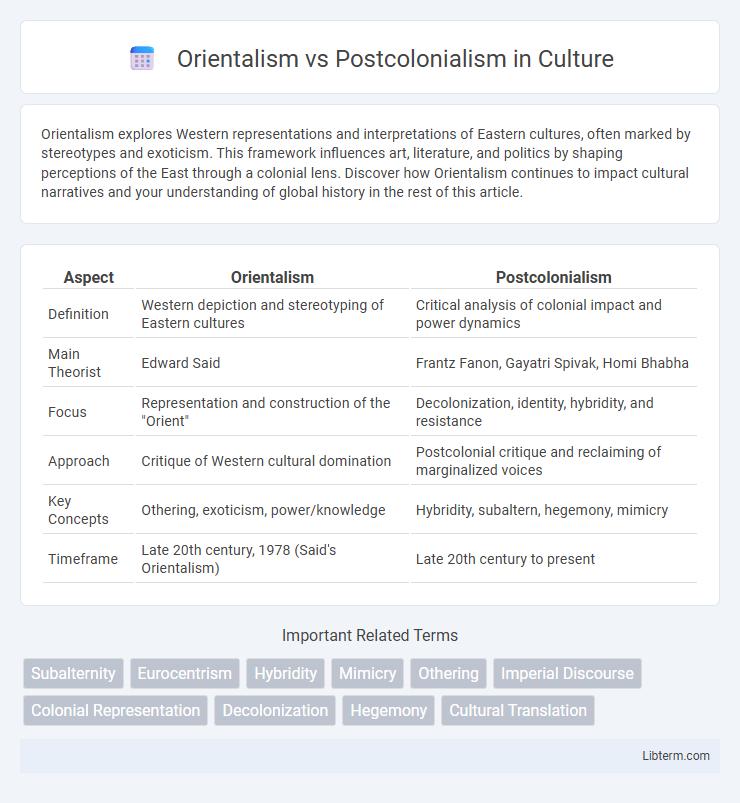Orientalism explores Western representations and interpretations of Eastern cultures, often marked by stereotypes and exoticism. This framework influences art, literature, and politics by shaping perceptions of the East through a colonial lens. Discover how Orientalism continues to impact cultural narratives and your understanding of global history in the rest of this article.
Table of Comparison
| Aspect | Orientalism | Postcolonialism |
|---|---|---|
| Definition | Western depiction and stereotyping of Eastern cultures | Critical analysis of colonial impact and power dynamics |
| Main Theorist | Edward Said | Frantz Fanon, Gayatri Spivak, Homi Bhabha |
| Focus | Representation and construction of the "Orient" | Decolonization, identity, hybridity, and resistance |
| Approach | Critique of Western cultural domination | Postcolonial critique and reclaiming of marginalized voices |
| Key Concepts | Othering, exoticism, power/knowledge | Hybridity, subaltern, hegemony, mimicry |
| Timeframe | Late 20th century, 1978 (Said's Orientalism) | Late 20th century to present |
Defining Orientalism: Origins and Key Concepts
Orientalism, a concept popularized by Edward Said in his 1978 work, critiques Western depictions of Eastern societies as exotic, backward, and fundamentally different to justify colonial domination. Its origins trace back to 18th and 19th-century European scholarship and art that constructed rigid binaries between the West (Occident) and the East (Orient). Key concepts include the portrayal of the Orient as a monolithic, timeless other, and the power-knowledge relationship that enables cultural imperialism and stereotypes in academic and political discourses.
Postcolonialism: Emergence and Core Ideas
Postcolonialism emerged in the mid-20th century as a critical framework analyzing the cultural, political, and economic impacts of colonialism and imperialism on formerly colonized societies. It challenges the Eurocentric narratives established by Orientalism by emphasizing the voices, histories, and identities marginalized under colonial rule. Core ideas of postcolonialism include decolonization of knowledge, hybrid identity formation, and resistance against neocolonial power structures.
Historical Context: Colonial Encounters and Academic Discourse
Orientalism emerged in the 18th and 19th centuries as a scholarly framework during European colonial expansion, shaping Western perceptions of the East through a lens of cultural superiority and exoticism. Postcolonialism developed in the mid-20th century as a critical response, examining the lasting impacts of colonialism on formerly colonized societies and deconstructing the power dynamics entrenched in Orientalist discourse. Both fields interrogate the historical context of colonial encounters and the academic narratives that justified imperial domination and shaped global cultural hierarchies.
Edward Said’s Orientalism: Impact and Critique
Edward Said's seminal work *Orientalism* critiques Western representations of the East as stereotypical and hegemonic constructs that justify colonial dominance. His analysis dismantles these Orientalist portrayals by exposing their basis in power relations, influencing postcolonial theory's emphasis on decolonizing knowledge and challenging Eurocentric narratives. Subsequent critiques highlight the need for nuanced approaches to avoid overgeneralization and acknowledge diverse Eastern voices within postcolonial discourse.
The Scope of Orientalist Representation
Orientalist representation predominantly frames Eastern societies through exoticism and cultural essentialism, reinforcing stereotypes rooted in colonial power dynamics. Postcolonialism challenges this scope by critically examining how such portrayals perpetuate Eurocentric narratives and advocate for re-centering marginalized voices. This shift broadens the analytical framework to include agency, hybridity, and resistance within colonized cultures.
Postcolonialism: Voices from the Margins
Postcolonialism critically examines the legacies of colonialism by amplifying voices from the margins, emphasizing the perspectives of indigenous peoples and formerly colonized societies. This field challenges dominant Western narratives by highlighting cultural hybridity, identity struggles, and resistance against imperial power structures. Key theorists like Gayatri Spivak and Homi Bhabha explore subaltern agency and the politics of representation, reshaping discussions on power, history, and globalization.
Methodologies: Comparative Approaches in Analysis
Orientalism employs critical discourse analysis to deconstruct Western representations of the East, emphasizing power dynamics and textual interpretation rooted in Edward Said's framework. Postcolonialism broadens this methodology by integrating interdisciplinary approaches such as hybridity theory, subaltern studies, and decolonial epistemologies to challenge colonial narratives and recover marginalized voices. Comparative analysis within these fields juxtaposes colonial and postcolonial texts to reveal transformations in identity, resistance, and cultural negotiation across different historical and geopolitical contexts.
Orient vs. Occident: Shifting Power Dynamics
Orientalism constructs the Orient as an exotic and inferior "Other" contrasted against the rational, dominant Occident, reinforcing colonial power structures. Postcolonialism critiques these essentialist binaries, revealing how power dynamics evolve as formerly colonized societies challenge Western hegemony and reclaim their agency. The shifting power dynamics highlight the contestation between imposed representations and indigenous voices in redefining identity and authority.
Contemporary Debates: Relevance in Global Studies
Orientalism, as conceptualized by Edward Said, critiques Western depictions of Eastern societies as exotic and inferior, shaping power dynamics in colonial discourse. Postcolonialism expands this critique by examining broader consequences of colonial legacies, including identity, resistance, and cultural hybridity in formerly colonized nations. Contemporary debates in global studies emphasize the ongoing relevance of these frameworks to analyze neo-colonial practices, globalization, and transnational power relations, highlighting their critical role in understanding cultural representation and political economy today.
Conclusion: Intersections and Divergences
Orientalism and postcolonialism intersect in their critical examination of power dynamics and representations shaped by colonial histories, revealing how Western discourses constructed the "Orient" as an exoticized Other. Divergences emerge as Orientalism centers on the analysis of cultural depiction and knowledge production, while postcolonialism expands to include the lived experiences, resistance, and agency of formerly colonized peoples within ongoing socio-political contexts. This nuanced interplay underscores the evolution from theoretical critique toward more comprehensive frameworks addressing both representation and decolonization processes.
Orientalism Infographic

 libterm.com
libterm.com